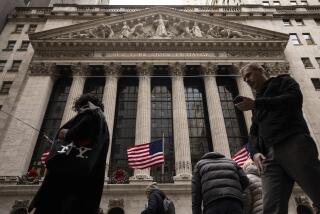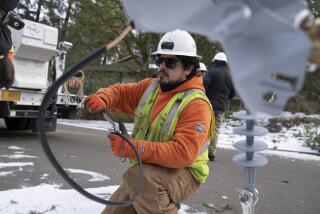Consumers’ optimism rising, survey shows
- Share via
Consumer confidence and expectations have risen, and more employers are planning to hire workers in 2010, according to studies released Tuesday, signaling increasing economic strength.
A consumer expectations index formulated by the Conference Board rose to its highest level in two years, but Americans still feel pessimistic about their current state. The nonprofit organization’s “present situation index” fell to its lowest point in 26 years.
“While the worst of the economic times are behind us, it’s not euphoria,” said Lynn Franco, director of the board’s Consumer Research Center. “Confidence is stronger than when we started the year, but for much of the last several months we’ve been moving sideways.”
The consumer confidence index rose to 52.9 in December, a three-month high after increasing to 50.6 in November from October’s 48.7 and February’s historic low of 25.3.
But confidence is still shaky, according to the index, which last reached a “stable” 90.6 reading in 2007. The data are based on a monthly survey conducted by research firm TNS covering a sample of 5,000 U.S. households.
Consumer spending, however, is still moving ahead at “fairly respectable rates,” said Brian Bethune, chief U.S. financial economist for IHS Global Insight. But the steep discounts and inventory clearance sales that are helping spending now could create a vacuum in early 2010.
“Barring a New Year’s miracle in the labor markets, it will be an enormous challenge to maintain forward momentum on real consumer spending early next year,” he said in a statement.
Still, expectations are high for the next six months, buoyed by improvements in the business and labor markets. The Conference Board expectations index jumped to 75.6 from 70.3 in November, reaching the highest level since the 75.8 recorded in December 2007.
But worries about short-term income, which Franco said probably would affect spending early in the new year, dragged down the present-situation index to 18.8 from 21.2 in November. The index hit a low of 17.5 in February 1983.
A separate report by online jobs site CareerBuilder.com had more mixed news.
While 20% of employers said they would add full-time, permanent workers in 2010, compared with 14% who said they would do so in 2009, actual job growth probably won’t arrive until the second quarter.
“There have been many signs over the past few months that point to the healing of the U.S. economy, especially the continued decrease in the number of jobs lost per month,” CareerBuilder.com Chief Executive Matt Ferguson said in a statement.
Just 9% of employers intend to cut workers in 2010, while 16% said they would swing the ax in 2009. Another 61% said their staffing levels probably would stay the same, according to the study, which surveyed more than 2,700 hiring and human resource professionals in November.
More to Read
Inside the business of entertainment
The Wide Shot brings you news, analysis and insights on everything from streaming wars to production — and what it all means for the future.
You may occasionally receive promotional content from the Los Angeles Times.











